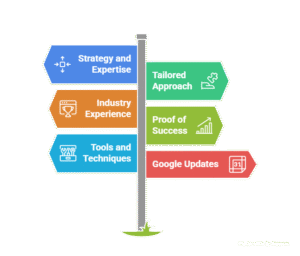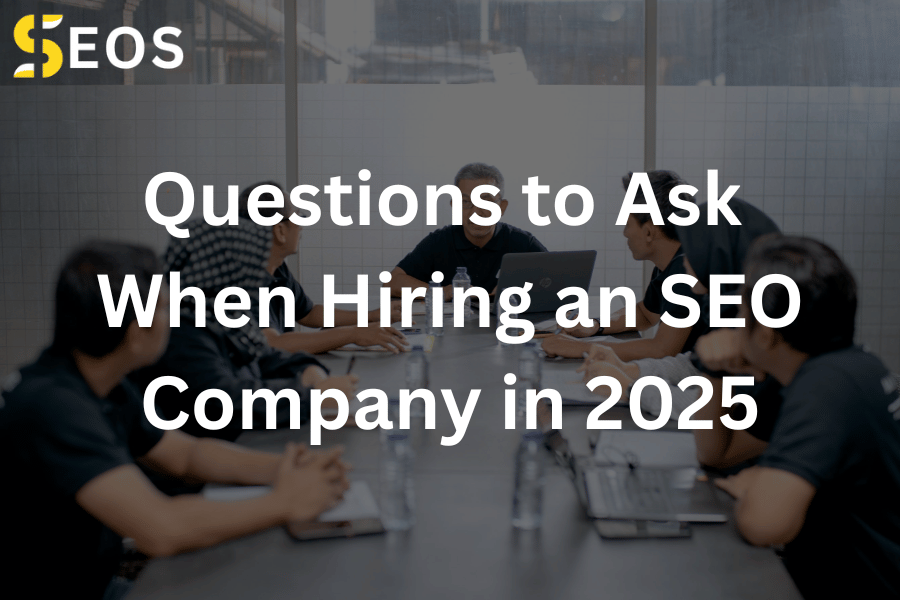When hiring an SEO company, you’ll want to ask direct questions about their strategy, experience, and results. For example, start with “What is your overall SEO approach?” and “How do you measure success?”. This ensures they have a clear plan for your business goals. Good agencies will have a data-driven, customized strategy – not a one-size-fits-all template. They should explain exactly what they’ll optimize (on-page content, off-page links, technical SEO, etc.) and why.
Ask about strategy and expertise:
-
“What will you actually do for my website?” – They should describe on-page tactics (like improving content and site structure) and off-page work (like earning high-quality backlinks). A trustworthy agency has a solid plan for both on-page and off-page SEO.
-
“Is your approach tailored to my business?” – Watch out for cookie-cutter promises. Experts say a real SEO plan is based on your specific niche, competitors, and audience. Don’t settle for a template strategy.
-
“Do you have experience in my industry or similar businesses?” – Industry knowledge can give them a head start. Ask for case studies or examples of past clients like you. An agency with relevant experience should explain how they overcame challenges in that field.
-
“Can I see proof of success?” – Request case studies or client references. Look for measurable results in those stories (increased traffic, better rankings, more leads) and how long those improvements took. If they hesitate to share real results, that’s a red flag.
-
“What tools and techniques do you use?” – A professional agency will use industry-standard tools (like Google Analytics, Ahrefs, SEMrush, etc.) to research keywords and track progress. They should also explain any in-house tools. This shows they have the technical capability to analyze your site and competition.
-
“How do you keep up with Google’s updates?” – SEO is always changing. The agency should stay current on major algorithm changes (like Google’s Panda or Page Experience updates) and adapt your strategy accordingly. In fact, higher-ups at Google warn that if an SEO can’t explain recent updates, that’s concerning.

Measuring success and timelines:
-
“How will you measure SEO success for my business?” – Make sure the answer focuses on real business goals, not just vanity metrics. Ask what KPIs they will track (for example, organic traffic, rankings for target keywords, and especially leads or conversions). Good agencies tie SEO to your bottom line. They shouldn’t just promise top rankings; they’ll explain how each metric relates to your goals.
-
“How long until we see results?” – SEO takes time. Expect at least 3–6 months for noticeable improvements. Any quick-fix promise is suspicious. One expert warns that real SEO isn’t instant, and warns to be wary of agencies promising overnight success. A legitimate team will give you a realistic timeline after auditing your site.
-
“Do you guarantee rankings or traffic?” – Take this as a red flag question. In fact, Google’s own search engineer says “any promises with regards to ranking or traffic… are usually a red flag”. No one can promise #1 for a keyword. A reputable SEO firm will say that they can’t guarantee specific rankings, only that they will do the work to improve your visibility over time.
-
“What happens if we don’t see improvement?” – It’s good to know they have a plan. A reliable SEO team will monitor progress closely and adjust tactics. They might retest keywords or update content. If results lag, they should communicate that and explain next steps.
Communication and collaboration:
-
“Who will be my main contact?” – Make sure you’ll have a dedicated account manager or point of contact. Agencies should tell you who on their team you’ll be talking to day-to-day.
-
“How often will we communicate and get reports?” – Ask for their reporting schedule. Common practice is monthly reports, but you might want weekly or quarterly updates. Reports should cover key metrics and progress toward your goals. Don’t accept vague reporting; a good report breaks down things like organic traffic growth, keyword ranking changes, backlinks earned, and how SEO is impacting your leads or sales.
-
“How much involvement do you need from me?” – Clarify your role. In the beginning, they’ll likely need info like your brand guidelines, target audience, or site access. But beyond initial setup, know what they expect. If you prefer hands-on involvement (for reviews or content input), let them know. A clear answer shows they’ve done this with clients before.
Pricing, deliverables, and contracts:
-
“What is your pricing model?” – SEO firms use different models (monthly retainers, hourly consulting, or flat fees). Ask exactly what you’re paying for. Are there setup fees? Does the monthly fee cover a certain amount of work or deliverables? Get the pricing details up front so you can compare apples to apples.
-
“What will I get for that price?” – Demand a clear list of deliverables. For example, they might commit to a website audit, 4 blog posts per month, outreach for 10 backlinks, etc. A reputable agency will outline exactly what services and content they’ll deliver. Make sure all promised deliverables (reports, content, links built, etc.) are spelled out in writing, ideally in the contract.
-
“How long is the contract and can I cancel?” – Many SEO companies want a 6–12 month contract, since SEO is a long-term effort. Ask what happens if you cancel early. Will you be charged a fee? Can you get out if you’re unhappy? Understanding the terms helps avoid surprises later.
Beware of red flags:
-
Promises of instant results. Reputable SEO experts say “be wary of agencies promising overnight success”. Any guarantee of #1 ranking or a fixed increase in traffic is probably unrealistic (and often hides black-hat tactics). In fact, Google warns that specific ranking promises are a “red flag”.
-
Shady tactics. Ask a bit about how they build links or optimize content. If they hint at shortcuts (like buying links or keyword stuffing), walk away. White-hat SEO relies on quality content and ethical link-building. As one expert notes, “reputable SEO providers will not work with direct competitors” and will follow Google’s rules. If anything seems too good to be true (cheap packages, guaranteed placements), it probably is.
-
Lack of transparency. Avoid any agency that won’t give straight answers or documentation. For instance, if they refuse to show case studies or explain their methods, that’s a concern. They should be open about their tools, team, and strategies.
As a small business owner, you have many things to juggle. Asking the right questions up front helps you find an SEO partner who’s the right fit. A good agency will welcome these questions and give clear, honest answers. They’ll tailor a strategy to your needs, keep you updated on progress, and align SEO success with your business goals.





Comments are closed